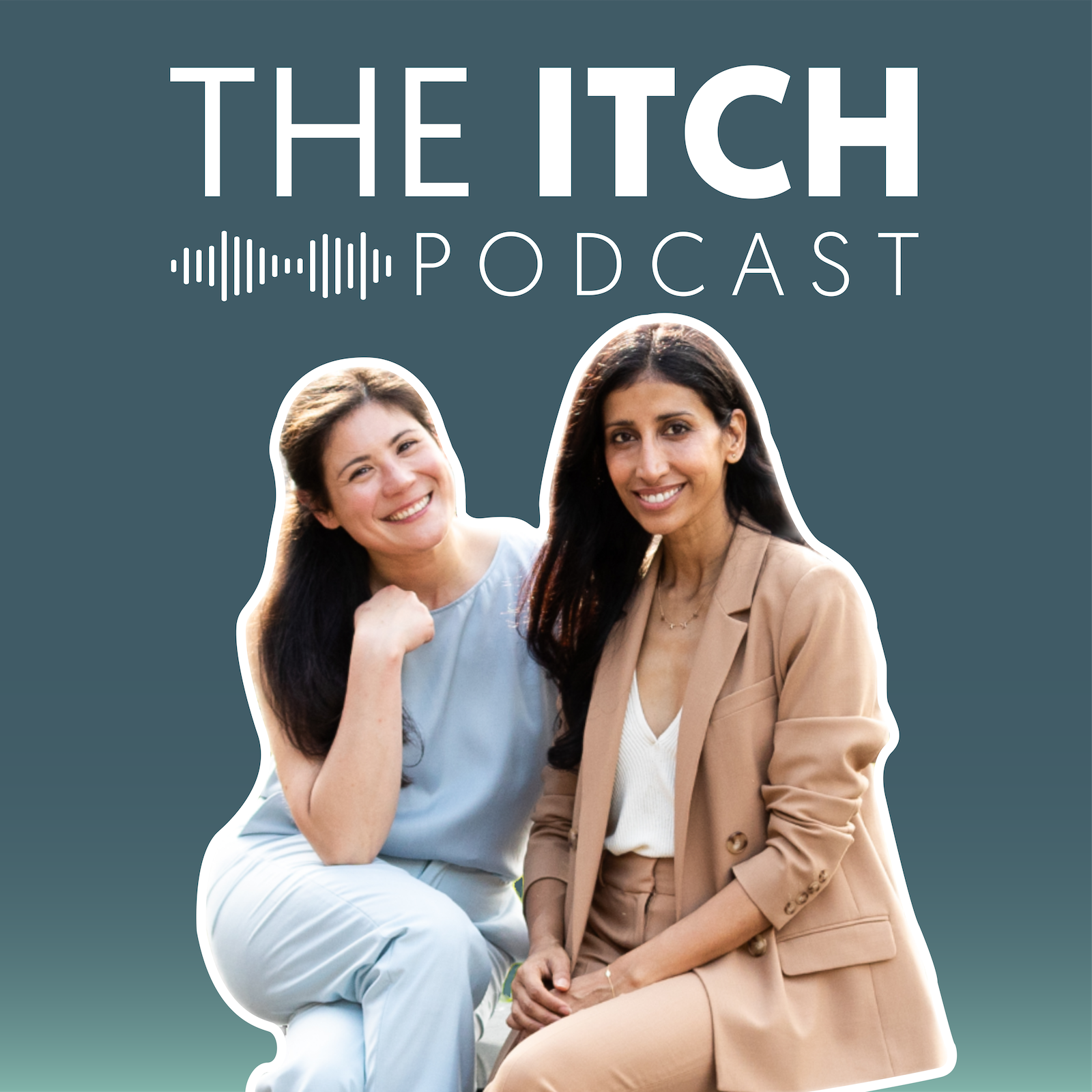Episodes
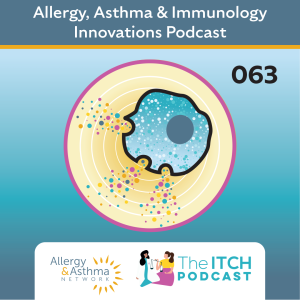
Thursday Jan 18, 2024
#63 - Mast Cell Diseases & Systemic Mastocytosis: The Basic Science
Thursday Jan 18, 2024
Thursday Jan 18, 2024
The basic science of mast cells is the first episode in our 6-part series exploring Mast cell diseases. To start the series, we explore the intricate workings of mast cells by diving into how they work and what happens when something is off balance.
Have you ever wondered what releases histamine and how this happens? Then this episode is for you!
What we cover in our episode about mast cell disease:
-
What are mast cells, and what do they do?
-
What are the different types of mast cell diseases?
-
Mastocytosis
-
Mast Cell Activation Syndrome
-
Hereditary Alpha-tryptasemia
-
-
The 7 types of mastocytosis
-
The cause of mast cell disease
-
KIT gene mutation in Mastocytosis
-
More resources about mast cell disease:
-
Mast Cell Disease page: https://allergyasthmanetwork.org/health-a-z/mast-cell-diseases/
-
What is Anaphylaxis? https://allergyasthmanetwork.org/anaphylaxis/
-
What is Epinephrine? https://allergyasthmanetwork.org/anaphylaxis/what-is-epinephrine/
We thank Blueprint Medicines for sponsoring this podcast.
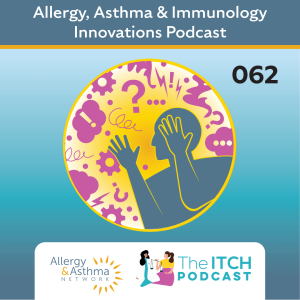
Wednesday Dec 06, 2023
#62 - Why is anxiety around anaphylaxis so common?
Wednesday Dec 06, 2023
Wednesday Dec 06, 2023
Fear and anxiety are very common when managing food allergies and anaphylaxis. It can come from the unknown, where the allergen can show up. It can also come from the way your allergies are discussed. How do you motivate patients to use their epinephrine without causing crippling anxiety?
Dr Golden joins us as we explore the delicate balance of doctors using fear to underscore the urgency of administering epinephrine during anaphylaxis. We discuss the crucial interplay between fear and anxiety, emphasizing the need for a sensitive approach to motivate patients to use their epinephrine without overwhelming those already grappling with anxiety.
We discuss the mind-body connection and the similarities between anxiety attacks and allergic reactions when talking about anxiety caused by the fear of having an anaphylactic reaction. Dr. Golden also provides more information about the risk and co-factors associated with severe anaphylaxis.
What we cover in this episode about anxiety related to anaphylaxis:
- Balance of fear and anxiety to get patients to use Epinephrine
- Mind-body connection around anxiety and anaphylaxis - anxiety attack’s similarity to a reaction
- Environment allergies - why you do not need to carry an Epinephrine device
- Risk factors and co-factors of severe reaction
- Epinephrine option for severe asthma
Helpful links:
- More about our guest Dr. David Golden
- What is Anaphylaxis? https://allergyasthmanetwork.org/anaphylaxis/
- What is Epinephrine? https://allergyasthmanetwork.org/anaphylaxis/what-is-epinephrine/
- What is a Food Allergy? https://allergyasthmanetwork.org/food-allergies/
- What If I Can’t Afford my Epinephrine Medication? https://allergyasthmanetwork.org/anaphylaxis/what-if-i-cant-afford-my-epinephrine/
- Episode sponsored by https://aquestive.com/anaphylm/.
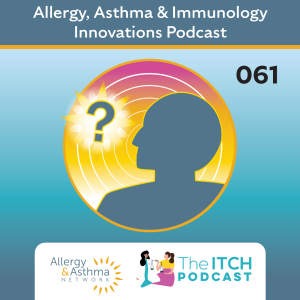
Tuesday Nov 14, 2023
#61 - New ways to administer epinephrine - what is on the horizon
Tuesday Nov 14, 2023
Tuesday Nov 14, 2023
Is a needle-free option for administering epinephrine coming out? Yes!
Dr. Golden joins us again in this episode to explore the new products in development for administering epinephrine.
What we cover in our episode about anaphylaxis and epinephrine:
-
The new types of ways to administer epinephrine:
-
Inhaler
-
Nose spray
-
Sublingual film
-
-
Why it has been challenging to find alternative ways to administer epinephrine other than an autoinjector.
-
How do we know the new forms of delivery will work?
-
How are companies proving that the new delivery method will work like the auto-injectors do?
-
How will studies be done to show the FDA that the new methods should be approved for patients to use?
-
Why do we need new ways to administer epinephrine?
-
Will there be hesitation to use the new forms of epinephrine delivery?
-
The importance of having doctors on board with these new forms of delivery.
More Resources about anaphylaxis and epinephrine:
-
More about our guest Dr. David Golden
-
More about Anaphylaxis: https://allergyasthmanetwork.org/anaphylaxis/
-
More about Epinephrine: https://allergyasthmanetwork.org/anaphylaxis/what-is-epinephrine/
-
What if I can’t afford my epinephrine? Learn more here: https://allergyasthmanetwork.org/anaphylaxis/what-if-i-cant-afford-my-epinephrine/
We want to thank Aquestive for sponsoring this episode.
Listen to episode 59 for more information on Anaphylaxis and Epinephrine
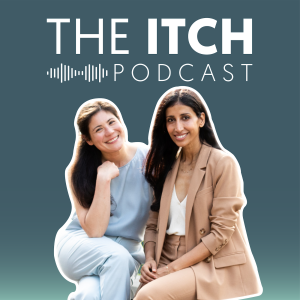
Wednesday Nov 08, 2023
#60 - Can you travel while on a biologic medication?
Wednesday Nov 08, 2023
Wednesday Nov 08, 2023
Biologic medications are supposed to help you live your life as normally as possible, but still, one has to wonder, can you travel while taking biologic medicines?
After releasing the episode on biologics for asthma, Dr. G and Kortney decided to explore how to travel while on a biologic successfully. They unpack what considerations patients need to take when planning their trip.
What we cover in our episode about traveling while taking a biologic medication
- Can you travel while on biologics, or can you only travel between doses?
- Can you travel with biologics that need to be administered by IV?
- Should patients get the green light from their doctor to travel?
- Is it possible to travel out of state or internationally?
- What should a patient consider when thinking about traveling
More about biologics, check out episode 56: https://www.itchpodcast.com/episodes/56-asthma-biologics
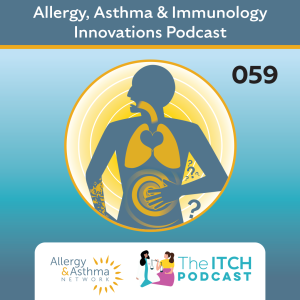
Monday Oct 23, 2023
#59 - What is anaphylaxis, and when to use epinephrine?
Monday Oct 23, 2023
Monday Oct 23, 2023
Have you ever wondered if it's anaphylaxis or just a severe allergic reaction? And how do you know when to use epinephrine? Diagnosing anaphylaxis can be challenging, and in this episode, we dive into this topic with our guest, Dr. David Golden.
What we cover in this episode:
- What is anaphylaxis
- When to use an Epinephrine device?
- How to determine if it is an allergic reaction or an anaphylactic reaction?
- How safe is it to use Epinephrine?
- Why is epinephrine used to treat anaphylaxis?
- Does epinephrine always work to treat anaphylaxis? Why would it not work?
- What are the side effects of Epinephrine?
- Do you have to go to the hospital after using Epinephrine?
- How does Epinephrine work?
- Why antihistamines do not work to treat anaphylaxis or a severe asthma attack
- Other treatments that are in the pipeline for anaphylaxis?
- Epinephrine dosing - how to know the right dose for kids and adults.
- When do you need a second dose of Epinephrine?
- Carrying two epinephrine devices
- Will the next anaphylactic reaction be worse?
- Why should we encourage having stock Epinephrine in schools, on planes, etc?
Helpful links:
- More about our guest Dr. David Golden
- More about Anaphylaxis: https://allergyasthmanetwork.org/anaphylaxis/
- More about Epinephrine: https://allergyasthmanetwork.org/anaphylaxis/what-is-epinephrine/
- What if I can’t afford my epinephrine? Learn more here: https://allergyasthmanetwork.org/anaphylaxis/what-if-i-cant-afford-my-epinephrine/
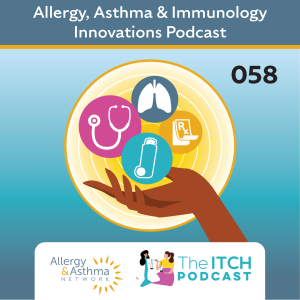
Wednesday Sep 06, 2023
#58: What is controlled Asthma? Everything you need to know!
Wednesday Sep 06, 2023
Wednesday Sep 06, 2023
In the second episode of the Allergy, Asthma & Immunology Innovations Podcast Series, Dr. G and Kortney dive into the critical topic of controlled and uncontrolled asthma. They shed light on various aspects of asthma, including its types, severity levels, medications, and the importance of asthma action plans.
This episode is especially important to our hosts as asthma has personally impacted them.
What we cover about controlled asthma:
-
A quick review of asthma
-
Types and severity levels of asthma
-
Asthma can manifest in various forms, including:
-
Allergic asthma (triggered by allergens).
-
Non-allergic asthma (triggered by factors other than allergens).
-
Occupational asthma (caused by workplace exposure).
-
Exercise-induced asthma.
-
Cough-variant asthma (primarily chronic cough).
-
Aspirin-exacerbated respiratory disease (AERD).
-
Late-onset asthma (developing in adulthood).
-
Eosinophilic asthma (inflammation-related).
-
Asthma can be categorized as mild, moderate, or severe based on symptoms and lung function tests. Severity impacts treatment strategies.
-
-
Medications for asthma management
-
Rescue or emergency medication (for mild asthma).
-
Controller medication (for moderate to severe asthma). Controller medications include inhaled steroids, other medications, and biologics for severe cases.
-
-
Assessing asthma control
-
Asthma control is evaluated based on the "Rule of 2s". If you have two or more of the following, your asthma may not be controlled;
-
Symptoms more than two days a week.
-
Quick-relief medication usage more than two times a week.
-
Nighttime awakenings due to asthma more than two times a month.
-
Asthma exacerbations require oral steroids twice a year.
-
-
What is good asthma control, and why is this important
-
The long-term effects of uncontrolled asthma
-
Asthma Peak Week.
-
Creating an asthma action plan
-
Working with healthcare providers and asthma coaches
Resources to help you with your asthma control:
Asthma Management and Control: https://allergyasthmanetwork.org/what-is-asthma/asthma-management-and-control/
Asthma Action Plan: https://allergyasthmanetwork.org/what-is-asthma/asthma-action-plan/ This page is great because it has multiple types of Asthma Action Plans.
Infographic about asthma peak in September: https://allergyasthmanetwork.org/images/Asthma/September_Asthma_Peak_July2023v1.pdf
Asthma Coach: www. AsthmaCoach.org and https://allergyasthmanetwork.org/free-asthma-coach-program/.
Lifestyle Changes to Manage Asthma: https://allergyasthmanetwork.org/what-is-asthma/lifestyle-changes-to-manage-asthma/
Biologic medications: www.BiologicMeds.org
Type 2 Inflammation: eosasthma.org https://allergyasthmanetwork.org/news/when-asthma-more-than-asthma-type-inflammation/

Wednesday Aug 09, 2023
#57 - What are ocular allergies? Unpacking allergies of the eyes and more!
Wednesday Aug 09, 2023
Wednesday Aug 09, 2023
Itchy, watery eyes? It may be an allergy that only impacts your eyes!
Dr. Luk joins Dr. G and Kortney to discuss ocular allergies, which are allergic reactions that affect the eyes.
Ocular allergies are common and can cause significant discomfort and impaired vision. However, many people are unaware of the different types of ocular allergies, the treatments available, or the importance of prevention. If you always find yourself with itchy, red and watery eyes or around certain things, this episode is for you!
What we cover about ocular allergies:
-
The difference between an ophthalmologist and an optometrist
-
Ocular allergy - what is this, and how is it different from systemic allergies?
-
The different types of ocular allergies:
-
Seasonal allergic conjunctivitis
-
Perennial allergic conjunctivitis
-
Vernal keratoconjunctivitis
-
Atopic keratoconjunctivitis
-
-
Treatment options for ocular allergies
-
The dangers of rubbing your eyes and what to do instead
-
All you need to know about eye drops
More about ocular eye allergy expert: Dr. Janice Luk
Dr. Janice Luk is a Toronto native who graduated with honors from the Doctor of Optometry and Bachelor of Science programs at the University of Waterloo. She is passionate about expanding her knowledge and bridging the gap between ocular aesthetics and dry eye disease. Janice communicates openly with her patients and volunteers with organizations like VOSH and Fighting Blindness Canada. She is an active member of multiple optometry associations.
Connect with her: https://www.instagram.com/ilukateyes/
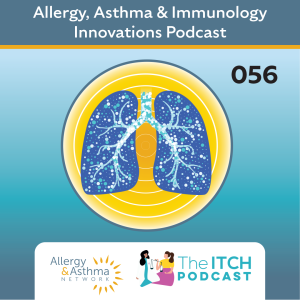
Monday Jul 17, 2023
#56 - Biologic Therapies for Asthma
Monday Jul 17, 2023
Monday Jul 17, 2023
Part of the series: Allergy, Asthma & Immunology Innovations Podcast
This podcast was made in partnership with Allergy & Asthma Network, with funding support from AstraZeneca.
In this episode, we explore a new form of asthma treatment, Biologics. These innovative treatments offer targeted relief by addressing the underlying causes of asthma, leading to improved symptom control and a better quality of life. Dr. G and Kortney discuss the current biologics on the market for asthma treatment.
As this is a true deep dive, we have provided some more information about the Biologics discussed to help you build a better understanding. We have included images and graphs you can use when listening to the episode.
What we cover in this episode:
- A background on how Biologic treatments work.
- The Biologics available for asthma - discuss who is a candidate, how they each work, how they are taken and some side effects.
- Omalizumab (Xolair)
- Mepolizumab
- Reslizumab
- Benralizumab
- Dupilumab
- Tezepelumab
Helpful links:
Images and graphs discussed in this episode: www.itchpodcast.com/episodes/56-asthma-biologics
A look at biologics in more depth: www.biologicmeds.org
More about type 2 inflammation: https://allergyasthmanetwork.org/news/when-asthma-more-than-asthma-type-inflammation/
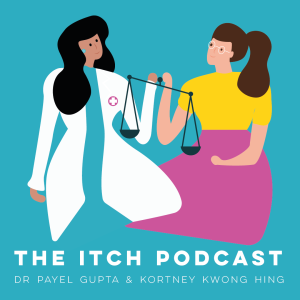
Wednesday May 10, 2023
#55 - What is a venom allergy?
Wednesday May 10, 2023
Wednesday May 10, 2023
Breaking down the facts behind a bee sting allergy and more!
In this episode, we delve into the world of venom allergies, focusing on allergic reactions caused by flying insects and fire ants. Our hosts are joined by Dr. Farah Khan, who shares her valuable expertise, in explaining the underlying mechanisms of allergic reactions to venom allergies.
What we cover in this episode:
- What types of insects can cause a venom allergy and lead to anaphylaxis; honey bees, bumble bees, wasps, hornets, yellow jackets and fire ants.
- Why mosquitos are not a concern for anaphylaxis.
- What a normal versus an allergic reaction to venom looks like.Local versus systemic reactions. What is the difference, and when do you need to worry that you will potentially have an anaphylaxic reaction.
- When should you see a doctor regarding your insect bite.
- Why testing is not straightforward for insect stings (venom allergy): insect sting allergies are rare, and we do not want to over-test. What happens after you have reacted a venom and how to work with your allergist.
- Only test people who have had an allergic reaction to a sting. Types of tests that would be used once you have reacted to venom.
- How to determine whether you are a candidate for immunotherapy.
- Why allergist test for systemic mastocytosis when talking about venom allergies.
- What to do when you get stung and the best medications to take.
- How to best prepare yourself to avoid getting stung.
- Advice to someone afraid of a stinging insect.
More information about this episode can be found here: www.itchpodcast.com/episodes/55-venom-allergy

Wednesday Apr 05, 2023
#54 - Early Introduction of Allergens in Babies
Wednesday Apr 05, 2023
Wednesday Apr 05, 2023
What is early allergen introduction for babies?
Are you still confused about when to feed your baby allergens? Over the past few decades, there has been quite a shift in thinking about the early introduction of food allergens for babies, so your confusion is wholly justified. Dr. G dives into this exact topic and talks to two professionals, Meenal Lele and Dr. Katie Marks-Cogan, in the field of early introduction. She explores why the guidelines for introducing allergens have changed and how to introduce allergens safely and consistently.
What we cover in this podcast about the early introduction of food allergens:
What inspired Meenal and Katie to develop products to help parents with early allergen introduction?
What is early food introduction? Why are we no longer avoiding food allergens in babies?
What studies have shaped the protocol change around introducing allergens to babies? How does this impact 'high-risk' children?
The challenges for the studies and compliance hurdles parents faced.
Why do babies develop food allergies? What hypotheses point to the increase in food allergies in children over the past three decades?
The guidelines for early introduction of allergens. How to feed allergens to infants safely?
Why do you want to consider the early introduction of allergens with your babies?
The role of food allergies in a baby's eczema: if your baby has eczema, will they develop food allergies? When to see an allergist for your baby?
What is the best practice for diagnosing a baby's allergies, and why is testing not always appropriate? How to work with your medical team and rely on something other than online information.
Fundamental studies about the early introduction of allergens: The LEAP study, EAT study, PETIT study
Guest Bios
Meenal Lele is the founder of Lil Mixins, an allergy prevention company for babies. With experience as a food allergy parent and clinical knowledge, she created the company to provide options for parents introducing allergenic foods to their babies. Meenal holds an engineering and business degree from the University of Pennsylvania. She is the author of The Baby and the Biome, a book exploring the connection between a child's microbiome and their health.
Dr. Katie Marks-Cogan, MD, FAAAAI, FACAAI, specializes in allergies, asthma, and sinus disease. She is the head allergist at Ready.Set.Food and provides top-notch care to both kids and adults at Clear Allergy in Downtown Culver City, CA. As a mom of two, Dr. Marks-Cogan was inspired to work with Ready.Set.Food. Originally from Cleveland, OH, she graduated with honors from the University of Maryland School of Medicine after earning a Bachelor of Science Degree in Physiology and Neurobiology from the University of Maryland College Park.

